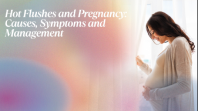Hot Flushes During Pregnancy: Why They Happen and What to Consider
November 28, 2024

Pregnancy is a beautiful, life-changing experience, but let’s be honest—it’s also full of unexpected twists and turns. One moment you’re glowing, and the next, you’re sweating bullets, fanning yourself frantically. That's how many women feel about hot flushes during pregnancy.
If you’re feeling overwhelmed by these sudden waves of heat, don’t worry—you’re not alone. Hot flushes are a common but lesser-discussed symptom of pregnancy, leaving many moms-to-be wondering why they’re happening and how to cope. In this blog, we’ll break it all down: why hot flushes occur, what they mean for you and your baby, and tips for staying cool (literally).
What Are Hot Flushes and How Do They Feel?
A hot flash is a sudden sensation of heat that seems to come out of nowhere. It can cause your face, neck, and chest to feel uncomfortably warm, and it might even make you break into a sweat. While they don’t last long—usually a few seconds to minutes—they can catch you off guard, especially during pregnancy.
Common symptoms of hot flushes include:
- A rapid rise in body temperature
- Sweating, often followed by chills
- A flushed face or neck
- A racing heart or mild dizziness
Though they’re more commonly associated with menopause, hot flushes can occur at other times, including during pregnancy.
Why Do Hot Flushes Happen During Pregnancy?
Pregnancy is a time of significant change in your body, and hot flushes are one way these changes manifest. Here are the main reasons behind those sudden temperature spikes:
- Hormonal Surges: Pregnancy hormones are the MVPs of this journey, but they can also be the culprits behind many uncomfortable symptoms. Specifically, fluctuating levels of estrogen and progesterone can affect your hypothalamus—the part of your brain that regulates body temperature—leading to those intense feelings of heat.
- Increased Blood Flow: During pregnancy, your blood volume increases significantly to support your growing baby. This boost in circulation makes your skin feel warmer and can trigger hot flushes, especially when combined with hormonal shifts.
- Changes in Metabolism: Your body's working overtime to nurture your little one, and as a result, your metabolism ramps up. This extra energy production generates heat, which can make you feel warmer than usual.
- Emotional Stress: Pregnancy is an emotional rollercoaster, and stress or anxiety can contribute to hot flushes. Emotional triggers can activate your body’s stress response, which often results in sweating or flushing.
- External Factors: Sometimes, it’s the environment that exacerbates hot flushes. A warm room, tight clothing, or even spicy food can trigger these episodes during pregnancy.
When Do Hot Flushes Start During Pregnancy?
Hot flushes can appear at any stage of pregnancy, but they’re most common during the second and third trimesters when hormonal and circulatory changes are at their peak. Some women even report experiencing hot flushes postpartum as their body adjusts to breastfeeding and hormonal changes.
Are Hot Flushes During Pregnancy Normal?
Yes! Hot flushes during pregnancy are a normal, albeit uncomfortable, symptom for many women. They’re usually harmless and don’t indicate any problems with your pregnancy. However, if hot flushes are accompanied by other symptoms like fainting, severe dizziness, or dehydration, it’s a good idea to consult your healthcare provider.
What You Should Consider About Hot Flushes During Pregnancy
- Stay Hydrated: Dehydration can make hot flushes worse, so it’s essential to drink plenty of water throughout the day. Keep a water bottle handy, and consider sipping on cool beverages when a hot flash strikes.
- Monitor Your Symptoms: If your hot flushes are severe or come with symptoms like chest pain, shortness of breath, or fainting, talk to your doctor. These could indicate an underlying condition that needs attention.
- Adjust Your Diet: Certain foods and drinks can trigger hot flushes. Limit caffeine, spicy foods, and alcohol, as these can raise your body temperature. Instead, opt for cooling snacks like watermelon or cucumber.
- Consider the Environment: Wear loose, breathable clothing and keep your living space cool. A portable fan or air conditioner can be a lifesaver during those unexpected heat waves.
How to Manage Hot Flushes Naturally During Pregnancy
- Layer Your Clothing: Dressing in layers allows you to remove clothing as needed when you feel a hot flash coming on. Lightweight, breathable fabrics like cotton or linen are your best friends during pregnancy.
- Practice Stress Management: Stress can worsen hot flushes, so find ways to relax and unwind. Gentle yoga, meditation, or even a short walk can help calm your mind and body.
- Stay Cool at Night: Night sweats can make it hard to get a good night’s sleep. Use lightweight bedding, a cooling pillow, or even an ice pack wrapped in a towel to stay comfortable.
- Use Cooling Products: Products like Coolzen, designed for managing temperature changes during menopause, can also be a great resource for pregnant women dealing with hot flushes. Learn more about how to stay cool with innovative solutions at Unpause.
- Eat Smaller, Balanced Meals: Large meals can spike your body temperature. Instead, aim for smaller, balanced meals throughout the day to keep your metabolism steady and avoid overheating.
When to Call Your Doctor
While hot flushes are a common part of pregnancy, it’s important to listen to your body. Reach out to your healthcare provider if you experience:
- Severe or persistent dizziness
- Chest pain or difficulty breathing
- Unexplained swelling
- Fainting spells
These symptoms could indicate an underlying issue that needs prompt attention.
Postpartum Hot Flushes: What to Expect
Hot flushes don’t always end with pregnancy. Many women experience postpartum hot flushes as their body adjusts to post-birth hormone levels. Breastfeeding can also trigger these episodes, as it suppresses estrogen production.
The good news? Postpartum hot flushes typically subside within a few weeks to months as your body finds its new equilibrium.
Conclusion
Hot flushes during pregnancy are completely normal and usually harmless, though they can be uncomfortable. Understanding the causes—hormonal changes, increased blood flow, and metabolic shifts—can help you manage this common pregnancy symptom effectively.
By staying hydrated, dressing in breathable layers, managing stress, and keeping your environment cool, you can reduce the frequency and intensity of hot flushes. And remember, if you’re ever concerned about your symptoms, don’t hesitate to consult your doctor.
If you’re looking for ways to stay cool and comfortable during pregnancy (or menopause!), be sure to check out Unpause for practical solutions and tips tailored to women’s health.
Pregnancy is a unique journey, and every symptom—even the unexpected ones—is a reminder of the incredible work your body is doing.










































